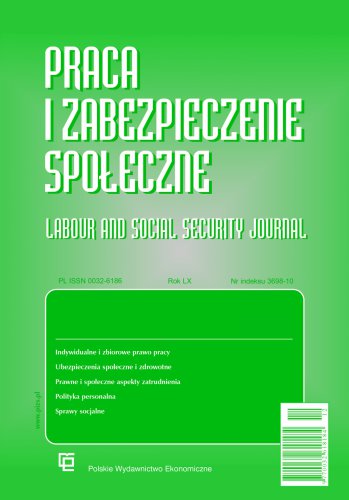Comments on the order to perform service remotely
Abstract One of the most recent amendments to the Labor Code (the Act of December 1, 2022 amending the Labor Code and certain other acts, Journal of Laws 2023.240 of 2023.02.06) permanently introduced remote work into the Polish legal order. With this amendment, the legislator also introduced changes to pragmatic laws granting supervisors (and persons authorized by them) the authority to order officers of certain militarized services to perform service remotely. The article presents an analysis of the latest provisions of these pragmatics in the scope regulating orders to perform remote service. The new regulations were added to the particular pragmatic laws with the amendment of the Labor Code. However, their form is more reminiscent of the (in force until recently) provision of Article 3 of the Law of March 2, 2020 on special solutions related to the prevention, prevention and combating of COVID-19, other infectious diseases and emergencies caused by them (Journal of Laws of 2021, item 2095, as amended). The manner in which the pragmatic laws are regulated shows that service performed remotely is not intended, by definition, to be an alternative to service performed in the traditional form. Instead, it is intended to create a solution used only in emergency situations. The decision on the rationale for issuing an order to perform service in remote form is left to the sole discretion of the officers' superiors (or their designees).
References
Bibliografia/References
Andrejuka, K. (2010). Glosa do wyroku SN z dnia 4 marca 2009 r. (II PK 202/08). Monitor Prawniczy, (17).
Baran, K. W., Książek, D., Witoszko W. (2020). Komentarz do niektórych przepisów ustawy o szczególnych rozwiązaniach związanych z zapobieganiem, przeciwdziałaniem i zwalczaniem COVID-19, innych chorób zakaźnych oraz wywołanych nimi sytuacji kryzysowych, art. 3. W: M. Barański, W. Bigaj, M. Borski, I. Florczak, K. Jaworska, K. Księżyk, M. Lekston, K. Naumowicz, M. Paluszkiewicz, A. Piszczek, A. Przybyłowicz, A. Rogacka-Łukasik, I. Sierocka, K. Stefański, J. Żołyński, K. W. Baran, D. Książek, W. Witoszko, Tarcza antykryzysowa 1.0–4.0, ustawa o dodatku solidarnościowym i inne regulacje, jako szczególne rozwiązania w prawie pracy, prawie urzędniczym i prawie ubezpieczeń społecznych związane z COVID-19. Komentarz. C.H.Beck.
Czechowski, M. (2016). Glosa do wyroku Trybunału Konstytucyjnego z dnia 3 marca 2015 r. (K 39/13). Praca i Zabezpieczenie Społeczne (1).
Grześków, M. (2020). Nawiązywanie stosunków zatrudnienia w służbach zmilitaryzowanych. C.H.Beck.
Jaśkowski, K., Maniewska E. (2023). Kodeks pracy. Komentarz aktualizowany, art. 11. LEX/el. Kuczyński, T. (2004). W: U. Kaliny-Prasznic (Red.) Encyklopedia prawa. C.H.Beck.
Kuczyński, T. (2011). Pojęcie i przedmiot prawa stosunków służbowych. W: T. Kuczyński i in. (Red.), System Prawa Administracyjnego. Tom 11. Stosunek służbowy. C.H.Beck.
Łętowski, J. (1969). Komentarz do orzeczenia SN z dnia 28 listopada1958 r. W: J. Starościak, J. Łętowski (Red.), Funkcjonowanie administracji w świetle orzecznictwa, t. II. Wydawnictwo Prawnicze.
Łętowski, J. (1972). Polecenie służbowe w administracji. Wydawnictwo Prawnicze.

